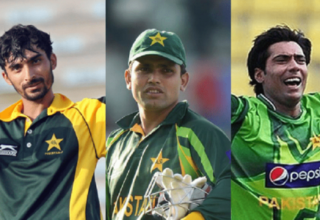
Sep 20(ABC): The International Cricket Council has announced a host of changes to its playing conditions ahead of the ICC Men’s T20 World Cup 2022, most significant of which is a permanent ban on the use of saliva to polish the ball.
The ICC had imposed the restriction earlier temporarily under COVID-related protocols. However, it has now been permanently banned.
“The Men’s Cricket Committee led by former India captain Sourav Ganguly recommended changes to the playing conditions in MCC’s updated third edition of the 2017 Code of the Laws of Cricket,” read a statement issued by the ICC on Tuesday.
It said that the conclusions were also shared with the Women’s Cricket Committee, who endorsed the recommendations.
The new playing conditions will come into effect on October 1, 2022, which means the ICC Men’s T20 World Cup in Australia next month will enforce the news rules, it added.
The main changes are as follows:
Batters returning when caught
When a batter is out caught, the new batter will come in at the end the striker was, regardless of whether the batters crossed prior to the catch being taken.
Previously, in case the batters crossed before a catch was taken, the non-striker would take strike the next ball while the new batter would be at the non-striker’s end.
Use of saliva to polish the ball
This prohibition has been in place for over two years in international cricket as a COVID-related temporary measure and it is considered appropriate for the ban to be made permanent.
The outbreak of COVID-19 had enforced the rule to avoid transmission of the virus on the field. The rule came into play when cricket resumed after a break in July 2020 and will now be made permanent. During the saliva ban, the players resorted to the use of sweat to shine the ball, which has proven to be effective.
Incoming batter ready to face the ball
An incoming batter will now be required to be ready to take strike within two minutes in Tests and ODIs, while the current threshold of 90 seconds in T20Is remains unchanged.
Previously, the incoming batter had three minutes to take strike in ODIs and Tests but it has now been reduced. Failing to do so, the fielding captain can appeal for timed out.
Striker’s right to play the ball
This is restricted so as to require some part of their bat or person to remain within the pitch. Should they venture beyond that, the umpire will call and signal dead ball. Any ball which would force the batter to leave the pitch will also be called no ball.
Unfair movement by the fielding side
Any unfair and deliberate movement while the bowler is running in to bowl could now result in the umpire awarding five penalty runs to the batting side, in addition to a call of dead ball.
Running out of the non-striker
The playing conditions follow the laws in moving this method of effecting a run out from the ‘unfair play’ section to the ‘run out’ section.
Previously looked down as unfair play, running out a non-striker for backing up too much will now be considered as a regular run-out.
Bowler throwing towards striker’s end before delivery
Previously, a bowler who saw the batter advancing down the wicket before entering their delivery stride, could throw the ball to attempt to Run out the striker. This practice will now be called a dead ball.
Other major decisions
The in-match penalty introduced in T20Is in January 2022, (whereby the failure of a fielding team to bowl their overs by the scheduled cessation time leads to an additional fielder having to be brought inside the fielding circle for the remaining overs of the innings), will now also be adopted in ODI matches after the completion of the ICC Men’s Cricket World Cup Super League in 2023.
The rule has already been implemented and has cost teams games due to them maintaining a slow over rate, one of the examples being the second match of the 2022 Asia Cup between India and Pakistan.























